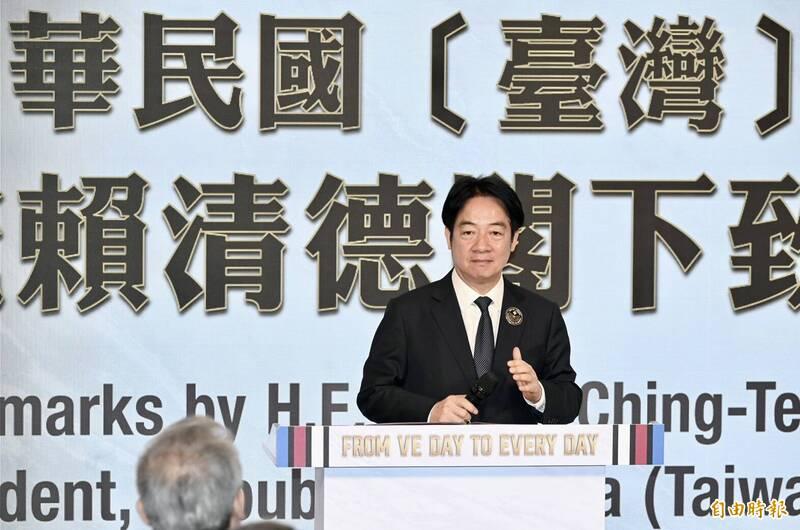Taiwan and Europe face the same threat from authoritarianism, President William Lai (賴清德) said today, marking 80 years since the end of World War II in Europe and warning that indulging aggressors only whets their appetite for expansion.
Taiwan has faced increased military pressure from China, including war games, as Beijing seeks to assert its sovereignty claims over the country, and has sought joint cause with Europe from the risk it faces from Russia.
Speaking to an audience including European, British, Japanese, Canadian and US diplomats based in Taiwan, Lai said Taiwan shares the same values as many of the democracies who fought in World War II.

Photo: Lo Pei-de, Taipei Times
"At many points in history, people have thought to give the aggressor a small concession to earn peace," Lai said at the Taipei Guest House, the residence of the governor-general under Japanese colonial rule of Taiwan, which ended in 1945.
"But as we all know from the painful lessons of World War II, indulging aggressors with a taste of expansion only whets their appetite; it makes them more confident and hungrier for more," he said.
Lai's speech coincided with Chinese President Xi Jinping's (習近平) visit to Russia for Moscow's military parade tomorrow to mark the war's end.
In an article for a Russian newspaper published yesterday, Xi said Taiwan legally belonged to China and no matter how the situation on Taiwan evolved or "what troubles external forces may make," the trend toward "reunification" was unstoppable.
Lai did not directly mention Russia or China by name, but said Taiwan and Europe face "the threat of a new authoritarian bloc," pointing to issues like damage to undersea cables — which both Taiwan and Europe have complained about — election interference and spread of disinformation.
"Lovers of freedom around the world, both individuals and nations, must work together now in tight solidarity, before risks turn into crises and before crises are taken advantage of by those with ambitions for outward expansion," he said.

Taiwanese can file complaints with the Tourism Administration to report travel agencies if their activities caused termination of a person’s citizenship, Mainland Affairs Council Minister Chiu Chui-cheng (邱垂正) said yesterday, after a podcaster highlighted a case in which a person’s citizenship was canceled for receiving a single-use Chinese passport to enter Russia. The council is aware of incidents in which people who signed up through Chinese travel agencies for tours of Russia were told they could obtain Russian visas and fast-track border clearance, Chiu told reporters on the sidelines of an event in Taipei. However, the travel agencies actually applied

Japanese footwear brand Onitsuka Tiger today issued a public apology and said it has suspended an employee amid allegations that the staff member discriminated against a Vietnamese customer at its Taipei 101 store. Posting on the social media platform Threads yesterday, a user said that an employee at the store said that “those shoes are very expensive” when her friend, who is a migrant worker from Vietnam, asked for assistance. The employee then ignored her until she asked again, to which she replied: "We don't have a size 37." The post had amassed nearly 26,000 likes and 916 comments as of this

New measures aimed at making Taiwan more attractive to foreign professionals came into effect this month, the National Development Council said yesterday. Among the changes, international students at Taiwanese universities would be able to work in Taiwan without a work permit in the two years after they graduate, explainer materials provided by the council said. In addition, foreign nationals who graduated from one of the world’s top 200 universities within the past five years can also apply for a two-year open work permit. Previously, those graduates would have needed to apply for a work permit using point-based criteria or have a Taiwanese company

The Shilin District Prosecutors’ Office yesterday indicted two Taiwanese and issued a wanted notice for Pete Liu (劉作虎), founder of Shenzhen-based smartphone manufacturer OnePlus Technology Co (萬普拉斯科技), for allegedly contravening the Act Governing Relations Between the People of the Taiwan Area and the Mainland Area (臺灣地區與大陸地區人民關係條例) by poaching 70 engineers in Taiwan. Liu allegedly traveled to Taiwan at the end of 2014 and met with a Taiwanese man surnamed Lin (林) to discuss establishing a mobile software research and development (R&D) team in Taiwan, prosecutors said. Without approval from the government, Lin, following Liu’s instructions, recruited more than 70 software